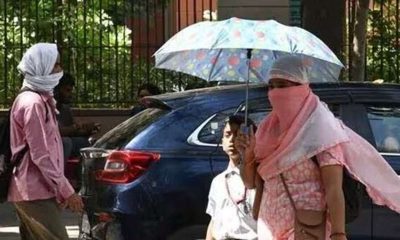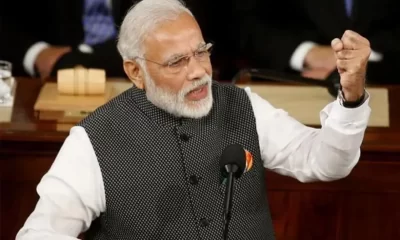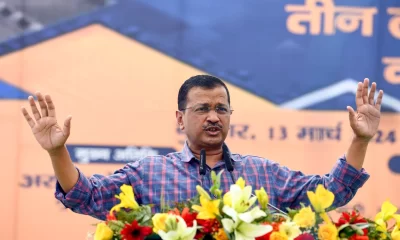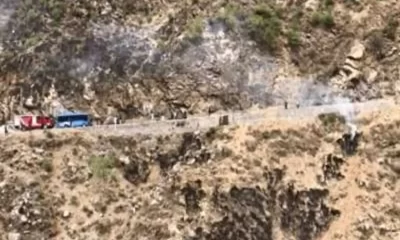India News
Heat wave sweeps Indian subcontinent, 11 hottest places in the world in India, 4 in Pakistan

[vc_row][vc_column][vc_column_text]A severe heatwave continued to sweep India’s northern plains and its western neighbour with the two together accounting for the 15 hottest places in the world today (Monday, June 3), 11 of them in India, according to weather monitoring website El Dorado.
The heat wave conditions are likely to continue for two days, according to Indian Meteorological Department (IMD).[/vc_column_text][/vc_column][/vc_row][vc_row][vc_column][vc_column_text]
| Maximum Temperature Last 24h – 06/03/2019 at 11:00 UTC | |||
| No. | Location | Station ID | Amount |
| 1 | Jacobabad (Pakistan) | 41715 | 50°C |
| 2 | Churu (India) | 42170 | 49.8°C |
| 3 | Ganganagar (India) | 42123 | 48.6°C |
| 4 | Pad Idan (Pakistan) | 41746 | 48.5°C |
| 5 | Sibi (Pakistan) | 41697 | 48.3°C |
| 6 | Phalodi (India) | 42237 | 48.2°C |
| 7 | Bikaner (India) | 42165 | 48.1°C |
| 8 | Rohri (Pakistan) | 41725 | 48°C |
| 9 | Jaisalmer (India) | 42328 | 47.8°C |
| 10 | Nowgong (India) | 42467 | 47.7°C |
| 11 | Narnaul (India) | 42177 | 47.6°C |
| 12 | Kota Aerodrome (India) | 42452 | 47.5°C |
| 13 | Barmer (India) | 42435 | 47.2°C |
| 14 | Sawai Madhopur (India) | 42453 | 47.2°C |
| 15 | Jhansi (India) | 42463 | 47.1°C |
| Script courtesy of Michael Holden of Relay Weather. Data courtesy of Ogimet | |||
[/vc_column_text][/vc_column][/vc_row][vc_row][vc_column][vc_column_text]The hottest was Jacobabad in Pakistan at 50C, just below the 50.8C recorded at Churu in Rajasthan on June 1. Temperature in Churu continued to hover around that range and was recorded at 49.8C.
Churu has issued a heat wave advisory and government hospitals have prepared emergency wards with extra air conditioners, coolers and medicines, said Ramratan Sonkariya, additional district magistrate for Churu, News18 reported.
Water is also being poured on the roads of Churu, known as the gateway to the Thar desert, to keep the temperature down and prevent them from melting, Sonkariya added.
A farmer from Sikar district in Rajasthan died on Sunday due to heatstroke, state government officials said.
At least 17 people had reportedly died over the past three weeks due to the heatwave in Telangana. A state official said it would confirm the number of deaths only after the causes had been ascertained.
Heat wave warnings were issued on Monday for some places in western Rajasthan and Madhya Pradesh.
Severe heatwave conditions continued unabated in Andhra Pradesh and Telangana. In Andhra Pradesh, Nellore, Guntur and Prakasam districts recorded maximum temperatures above 45 degrees Celsius. Adilabad district was the hottest in Telangana with a day temperature of 45.3 degrees Celsius. The IMD has issued heatwave warning at isolated pockets of the state for June 5 and 6.
Vaigai river which flows through the town of Theni, Andipetti, Madurai in Tamil Nadu has dried due to the intense heatwave in the region.
The IMD said heatwave conditions are likely to continue over the Northwest, Central and adjoining Peninsular India, today and tomorrow.
Relief from monsoon is set to be delayed by about a week and is expected to arrive in Delhi by July 6 instead of the normal date of June 29.
The three-month pre-monsoon season, which ended on May 31, was the second driest in the last 65 years, India’s only private forecaster, Skymet, said, with a national average of 99mm of rain against the normal average of 131.5 mm for the season.[/vc_column_text][/vc_column][/vc_row]
2024 Lok Sabha Elections
Mallikarjun Kharge vows to continue politics till his last breath to defeat BJP
The 81-year-old Congress leader was speaking at a election rally in Afzalpur and said that if the people did not vote for the Congress candidate, he would think that he did not have any place in Kalaburagi anymore.

Congress President M Mallikarjun Kharge on Wednesday appealed to the people of Kalaburagi to at least attend his funeral if they thought he worked for them even though they do not wish to vote for Congress in the ongoing Lok Sabha elections.
The 81-year-old Congress leader was speaking at a election rally in Afzalpur and said that if the people did not vote for the Congress candidate, he would think that he did not have any place in Kalaburagi anymore. The Congress President sought an emotional chord with the people of his home district of Kalaburagi, Karnataka
The grand old party has fielded Kharge’s son-in-law Radhakrishna Doddamani from Kalaburagi, against BJP’s sitting MP Umesh Jadhav. Kharge had won the Lok Sabha elections from Kalaburagi in 2009 and 2014, but lost in 2019. He appealed to the voters to vote for Congress but at least come to his funeral if they thought that he had done some work in Kalaburagi. Kharge added that he would continue in politics till his last breath to defeat the BJP and RSS ideology.
The Congress leader said he is born for politics and whether or not he contests the election, he will continue to strive till his last breath to save the Constitution and democracy of the country. He asserted that he will not retire from politics. Kharge said that retirement happens from a position but one should not retire from his/her principles. He said he is born to defeat the ideology of the BJP and RSS and not to surrender before them.
He advised Karnataka Chief Minister Siddaramaiah, who shared the stage with him, to follow his principles. He said he had told Siddaramaiah many times that he may retire as CM or MLA, but he cannot retire from politics till he defeats the ideology of the BJP and RSS.
2024 Lok Sabha Elections
Nitin Gadkari says he’s better now after collapsing at election rally in Maharashtra’s Yavatmal
A disturbing video of the incident – which was unfortunately streamed live on X (formerly Twitter), including by his own account – showed Nitin Gadkari being carried away by those on stage, many of whom rushed to form a shield around the BJP leader to give him, and those treating him, some privacy.

Union Road Transport and Highways Minister Nitin Gadkari collapsed while speaking at an election rally in Maharashtra’s Yavatmal on Wednesday afternoon. Fortunately, the senior Bharatiya Janata Party leader received prompt treatment and was able, after a brief pause, to get back up on stage and continue his speech.
A disturbing video of the incident – which was unfortunately streamed live on X (formerly Twitter), including by his own account – showed Nitin Gadkari being carried away by those on stage, many of whom rushed to form a shield around the BJP leader to give him, and those treating him, some privacy.
Nitin Gadkari took to X and informed that he felt uncomfortable due to the heat during the rally in Pusad, Maharashtra. But now he is completely healthy and is leaving for Varud to attend the next meeting. He thanked his supporters and well wishers for their love and good wishes.
Gadkari, who fought the elections in the first phase of voting as BJP’s candidate from Nagpur Lok Sabha seat, was campaigning for Eknath Shinde-led Shiv Sena leader Rajashree Patil in Yavatmal’s Pusad. Addressing the rally, the union minister said, he was confident that the people of Yavatmal district, which has a constant tendency towards development, will give victory to the BJP-Maha alliance, which believes in all-round development.
Gadkari posted on X that as the nation moves towards a developed India, under the leadership of Prime Minister Narendra Modi, significant work has been done in the last 10 years in the areas of roads and highways as well as health, education and other sectors across the country. He said many schemes of the central government were successfully extended to the rural areas. Due to this, along with the city, the people of the rural areas are also able to benefit from many important facilities.
The Yavatmal constituency along with Akola, Buldhana, Amravati, Hingoli, Wardha, Parbhani and Nanded in Maharashtra are scheduled to vote in the second phase of the Lok Sabha election on April 26.
2024 Lok Sabha Elections
PM Narendra Modi slams Congress over Sam Pitroda’s inheritance tax remarks, accuses Congress of intending to impose higher taxes
PM Modi was speaking at a public meeting in Chhattisgarh’s Surguja, where he alleged that the Congress wants to fill its own coffers by imposing ever higher taxes and not allowing people to pass on their hard-earned wealth to their children.

Prime Minister Narendra Modi on Wednesday launched a scathing attack on Congress after Sam Pitroda advocated for a US-style inheritance tax amid the ongoing debate over wealth redistribution. The comments have further fuelled an already-raging controversy over Rahul Gandhi’s promise to conduct a wealth survey if the Congress won the Lok Sabha election.
PM Modi was speaking at a public meeting in Chhattisgarh’s Surguja, where he alleged that the Congress wants to fill its own coffers by imposing ever higher taxes and not allowing people to pass on their hard-earned wealth to their children.
The Prime minister said the advisor (Sam Pitroda) of the prince and the royal family had said some time ago that more taxes should be imposed on the middle class. He said the Congress party says that it will impose an inheritance tax, and it will also impose tax on the inheritance received from parents. PM Modi added the children will not get the wealth that their parents accumulate through their hard work, rather the Congress party will snatch it away from them.
PM Modi said Pitroda’s remarks have exposed the dangerous intentions of the Congress. He took a veiled jibe at the Congress and said the party has only one mantra – to loot people zindagi ke sath bhi, zindagi ke baad bhi (in life and even after death).
The prime minister did not take any names and targeted the Gandhi family and said, those people who considered the entire Congress party as their ancestral property and handed it over to their children, now do not want Indians to pass on their property to their younger generations.
Indian Overseas Congress chairman Sam Pitroda while talking to the media backed his party’s stand on redistribution of wealth and called for a policy for the same while citing the concept of inheritance tax prevailing in some American states.
-

 2024 Lok Sabha Elections12 hours ago
2024 Lok Sabha Elections12 hours agoRahul Gandhi clarifies on wealth survey remark, says aim is to identify injustice
-

 Cricket news13 hours ago
Cricket news13 hours agoIPL 2024: Marcus Stoinis hits first IPL century as Lucknow Super Giants beat Chennai Super Kings by 6 wickets
-
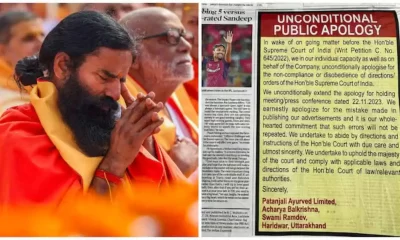
 India News11 hours ago
India News11 hours agoRamdev, Balkrishna publish bigger apology in newspapers after Supreme Court’s rap
-

 Trending10 hours ago
Trending10 hours agoA waiter’s life: Social media users go emotional on watching viral video
-
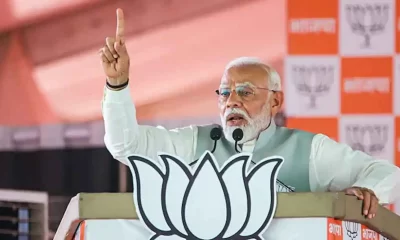
 2024 Lok Sabha Elections9 hours ago
2024 Lok Sabha Elections9 hours agoPM Narendra Modi slams Congress over Sam Pitroda’s inheritance tax remarks, accuses Congress of intending to impose higher taxes
-

 2024 Lok Sabha Elections6 hours ago
2024 Lok Sabha Elections6 hours agoNitin Gadkari says he’s better now after collapsing at election rally in Maharashtra’s Yavatmal
-

 2024 Lok Sabha Elections5 hours ago
2024 Lok Sabha Elections5 hours agoMallikarjun Kharge vows to continue politics till his last breath to defeat BJP
-

 Entertainment7 hours ago
Entertainment7 hours agoMadhuri Dixit, Karisma Kapoor recreate Dil To Pagal Hai dance battle on Dance Deewane

